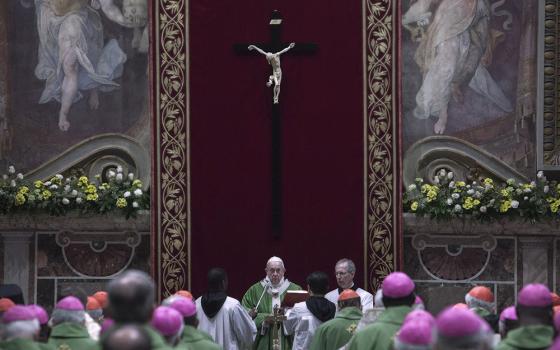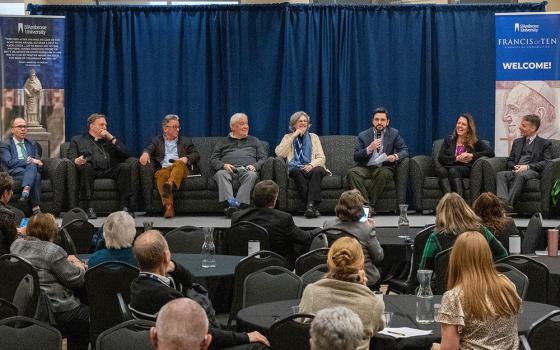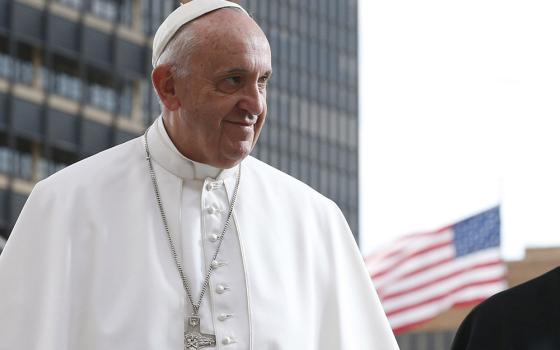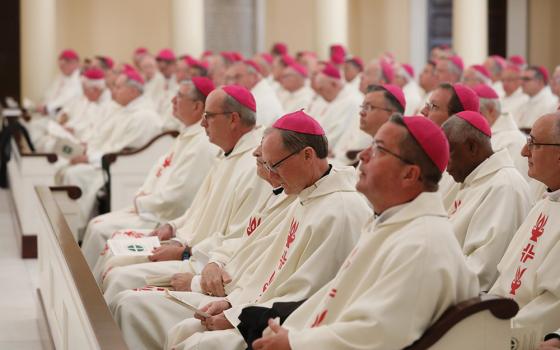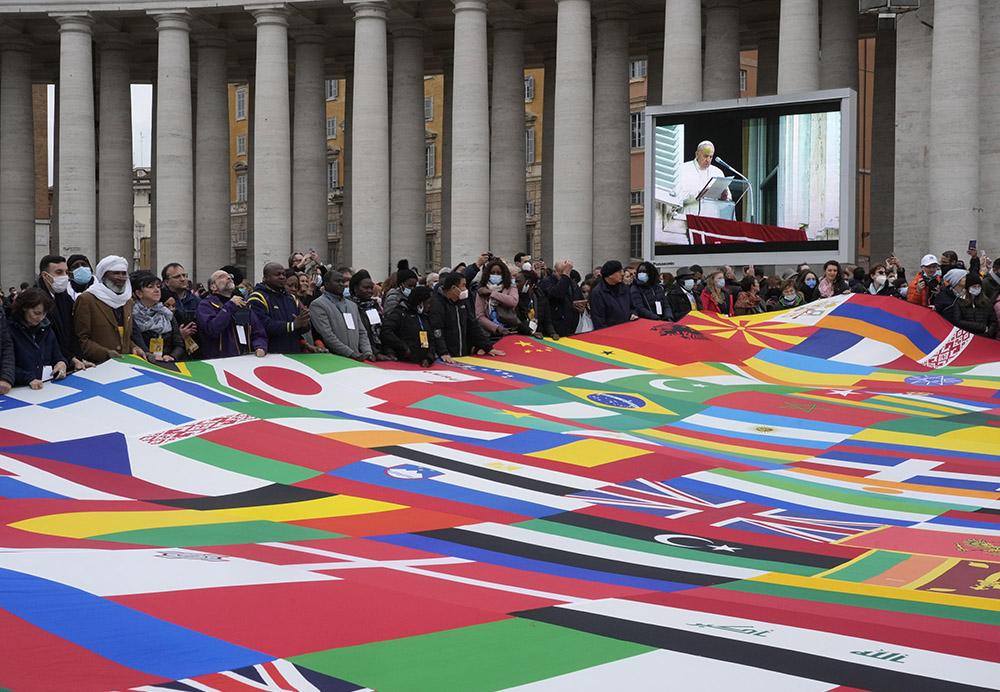
Members of a migrants association hold a huge banner made with the world's flags as Pope Francis delivers the Angelus prayer in St. Peter's Square at the Vatican Nov. 28, 2021. (AP/Gregorio Borgia)
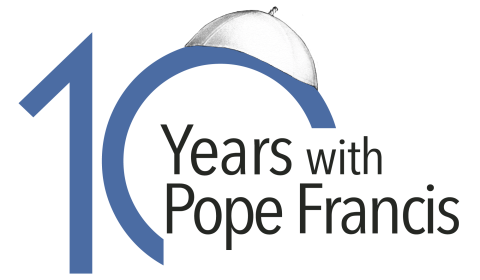
In a 1965 essay, the Jewish political philosopher Hannah Arendt recalled her travels in the Eternal City, when a chambermaid remarked upon the death of Pope John XXIII that "this pope was a real Christian."
"How could that be?" the chambermaid asked in disbelief. "And how could it happen that a true Christian would sit on St. Peter's chair?"
John XXIII presided over the opening of the Second Vatican Council and is remembered today for his landmark 1963 encyclical Pacem in Terris ("Peace on Earth"), written in the midst of the Cold War. The encyclical heralded a new era of peacemaking in Vatican diplomacy, calling for greater collaboration among religions and all people of goodwill to combat the threat of nuclear destruction.
Sixty years later — as Pope Francis marks the 10th anniversary of his election in the throes of what he has characterized as a third world war being fought piecemeal — the Vatican's foreign minister believes that the current successor to St. Peter's chair has also charted a Christocentric course in engaging the world around him.
"He's very much seeing the Petrine ministry as being something very much in the name of Christ and therefore, in the spirit of the Gospel," Archbishop Paul Gallagher told NCR in a Feb. 24 interview inside the Holy See's Secretariat of State. "Therefore, if the pope in some ways has got problems, it is because he's a little bit too Christian and too preoccupied with his own personal and the church's discipleship."
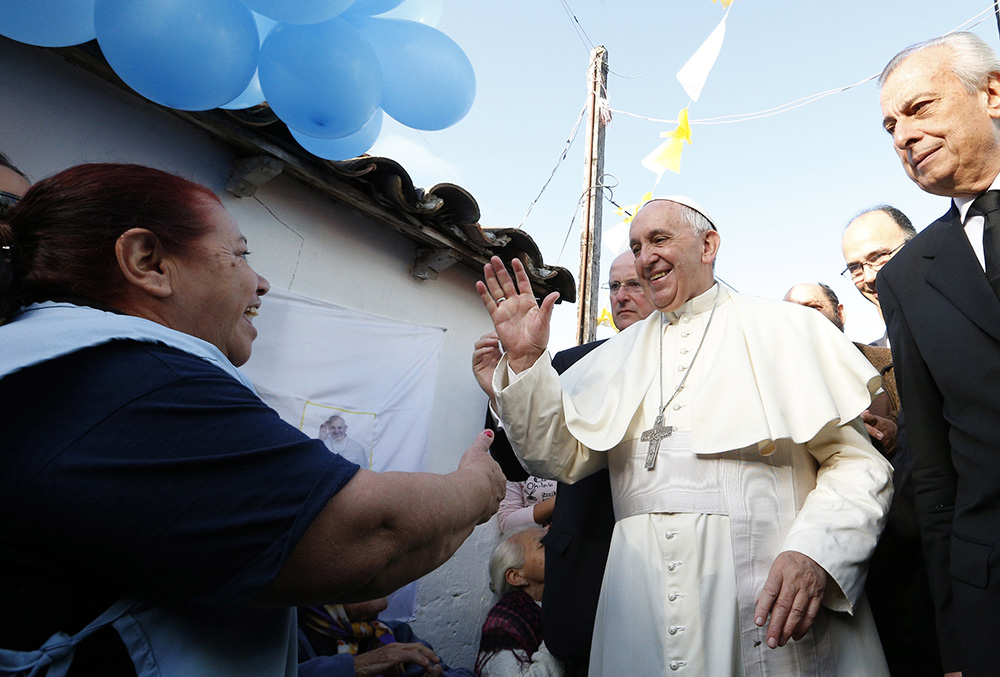
Pope Francis meets with people of Banado Norte, a poor neighborhood in Asunción, Paraguay, July 12, 2015. (CNS/Paul Haring)
"He tries to preach the Gospel, which is very much the Gospel of Christ, addressing the heart of men and women today, whom he believes are as much in need of that message and of that word, the word of God, as people were in the time of our Lord," Gallagher added.
When Gallagher, the first British-born prelate to hold the post, was appointed as the Holy See's secretary for relations with states in November 2014, Francis made it clear that he wanted a "proactive diplomacy, rather than a reactive diplomacy."
And according to Gallagher, a seasoned diplomat who previously served in Burundi, Guatemala and Australia, Francis has led by example.
"He hasn't been, shall we say, just following a classic sort of model," Gallagher told NCR. "You can see that from his journeys, his trips around the world. He hasn't gone to the most noted places. He's tended to choose places ... where there are conflicts and difficulties that are forgotten."
Papal diplomacy through travels and texts
Since his 2013 election, Francis has made 40 international trips — daringly becoming the first pope to enter an active war zone during a 2015 visit to the Central African Republic; meeting with Ayatollah Ali al-Sistani, the spiritual leader of the world's Shiite Muslims, during a March 2021 trip to Iraq; and undertaking a joint ecumenical visit in February to South Sudan, where the pope, the archbishop of Canterbury, England, and the moderator of the Church of Scotland begged the opposition leaders of the world's youngest country to work together for peace.
Beyond his travels, Francis has used his major documents to proactively influence global conversations and debate, often weighing in with decisive calls for action on some of the most pressing issues facing the world today.
The release of his 2015 environmental encyclical, "Laudato Si', on Care for Our Common Home," was credited with helping to rally world leaders to deepen their commitment to combating the climate crisis ahead of a major gathering in Paris later that year.
In 2019, the pope and the leader of the world's Sunni Muslims, Grand Imam Sheikh Ahmad el-Tayeb, jointly signed a document on "Human Fraternity for World Peace and Living Together," which has been widely praised as a major advancement in the Catholic Church's relationship with the Muslim world.
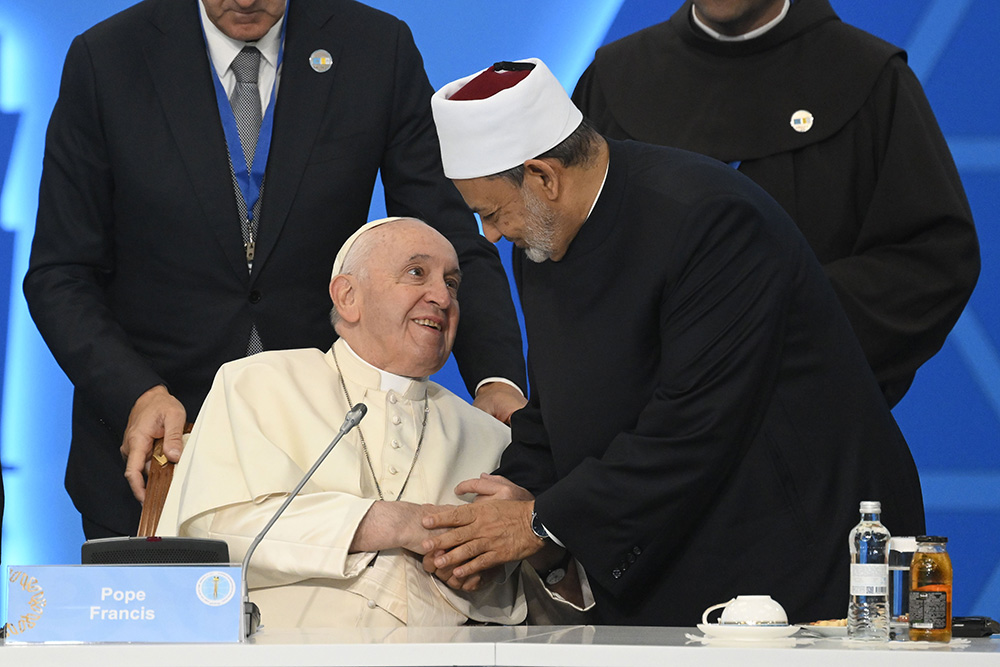
Pope Francis greets Sheikh Ahmad el-Tayeb, grand imam of Egypt's Al-Azhar mosque and university, during the Congress of Leaders of World and Traditional Religions at the Palace of Peace and Reconciliation in Nur-Sultan, Kazakhstan, Sept. 14, 2022. (CNS/Vatican Media)
Two years later, that document formed the basis for Francis' 2021 encyclical, Fratelli Tutti, which called for a rejection of war and a deepening of global solidarity.
According to Gallagher, Francis wanted to build on the momentum of the Second Vatican Council's calls for greater ecumenism and interreligious dialogue, especially with the Muslim world, with an aim toward deepening personal relationships to help peoples of various faiths and traditions see past their differences.
"One of the greatest difficulties that we have in our relations, and it's understandable, because we come from different places, we come from different cultures, different experiences, different histories, is the difficulty of recognizing our common humanity, that, in fact, we're much more like each other than we are distinct from each other," Gallagher said.
"Believing that there are distinctions and differences creates barriers between us," he continued. "And those barriers sometimes become the basis of which problems arise and conflicts are born."
Ken Hackett, who served as the U.S. ambassador to the Holy See from 2013 to 2017, offered a similar observation, telling NCR that more than any other pope, Francis has "engaged the world stage and encouraged his people to engage."
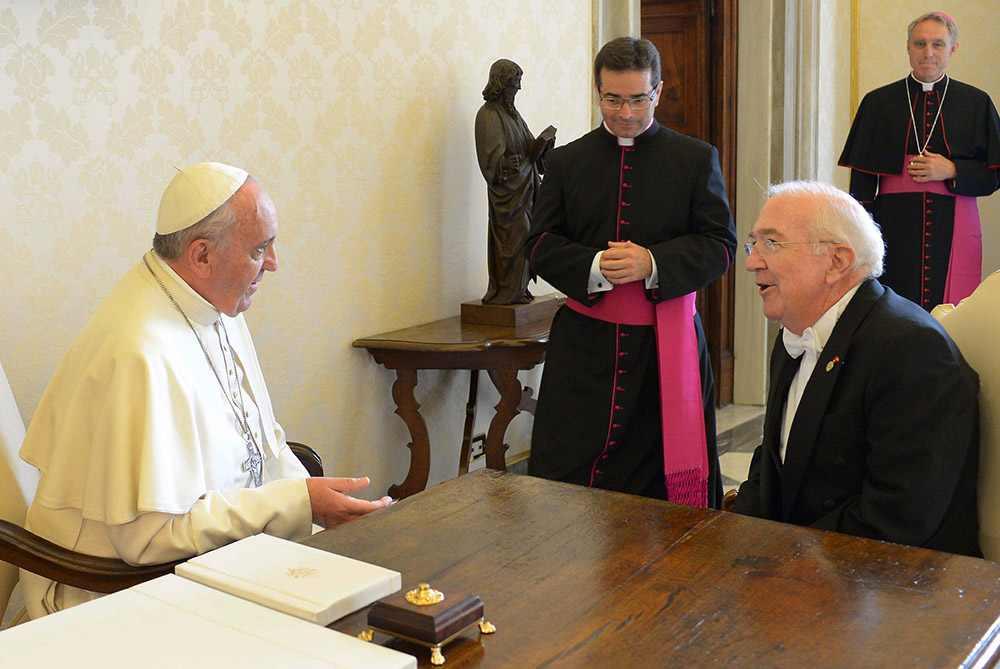
Pope Francis talks with Ken Hackett, then U.S. ambassador to the Holy See, during a meeting at the Vatican Oct. 21, 2013. (CNS/L'Osservatore Romano)
Hackett, author of The Vatican Code: American Diplomacy in the Time of Francis, said that Francis' philosophy of a "culture of encounter" allows the pope to employ a number of different strategies when trying to leverage the church's moral authority.
Hackett recalled when in June 2014 Francis invited Israeli President Shimon Peres and Palestinian Authority President Mahmoud Abbas to join him and the Orthodox Ecumenical Patriarch Bartholomew for a time of joint prayer and the planting of an olive tree inside the Vatican gardens in an effort to promote peace in the Middle East.
On another occasion, Francis wrote to U.S. President Barack Obama and Cuban President Raúl Castro in an effort to help facilitate the normalization in relations between the two countries. And on Feb. 25, 2022, the day after Russia's invasion of Ukraine began, Francis left the Vatican and went to the Russian Embassy to the Holy See to express his concerns over the war, in what Hackett described as an "unprecedented" gesture.
While the former ambassador admitted that "not all of these efforts worked," he said that "Francis sees the culture of encounter as important" and is willing to try creative approaches to global engagement.
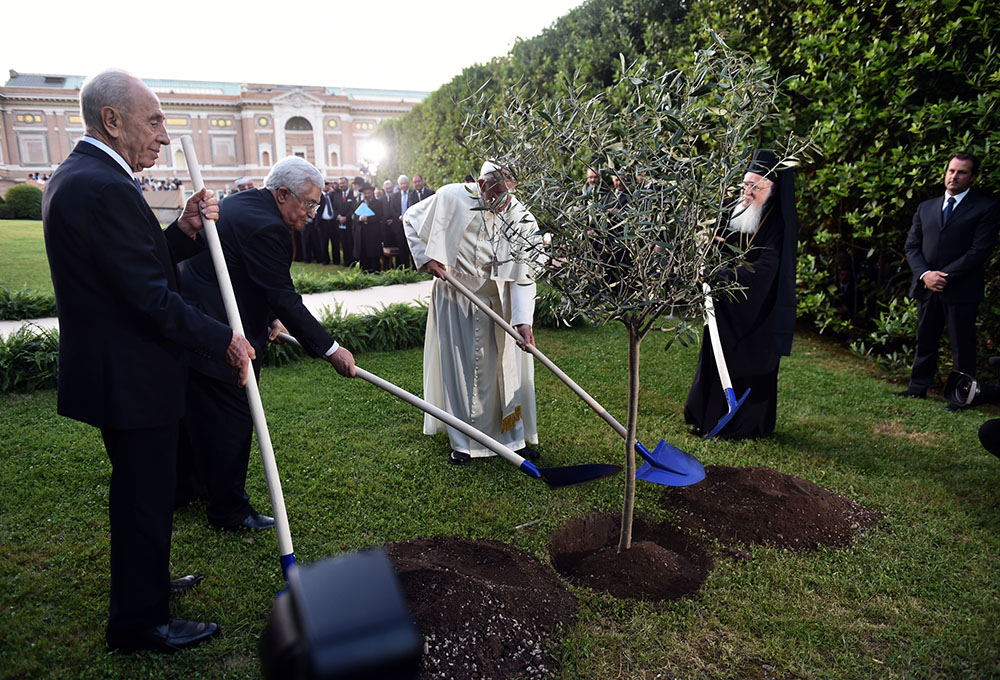
Israeli President Shimon Peres, Palestinian President Mahmoud Abbas, Pope Francis and Ecumenical Patriarch Bartholomew of Constantinople plant an olive tree after an invocation for peace in the Vatican Gardens June 8, 2014. (CNS/Cristian Gennari, pool)
Anne Leahy, who served as Canada's Vatican ambassador from 2008 to 2012, told NCR that "there is no other country where the president or prime minister embodies so personally the foreign policy of a state" as that of the Holy See.
One hallmark of Francis' diplomacy, said Leahy, have been "gestures that mark the imagination," she said, recalling a now iconic scene from 2019, when Francis got on his knees and kissed the feet of South Sudan's political leaders at the Vatican, imploring them not to return to civil war.
"These are personal gestures, which come from the heart," she observed. "How effective that is in influencing policy, we still don't know."
For his part, Gallagher said he believes that Francis' openness to others and his ability to look at the hearts of people — "beyond what perhaps the rest of us see" — has been a defining marker of his public reception.
"He is literally, in my experience, the most courteous and attentive person I have met in my life," Gallagher said. "And that makes an impact. I think he's tried to instill that into others and into his diplomatic service, as well, with a renewed openness to others."
Advertisement
Peter's mission of peace in Ukraine
Perhaps no two issues of the Holy See's diplomatic outreach under Francis have come under greater scrutiny than the Vatican's response to the war in Ukraine and an agreement with China over the appointment of Catholic bishops in the vast country.
On both fronts, Gallagher believes that the pope occupies a unique position where long-term dialogue must prevail over short-term calculations.
Since the start of Russia's February 2022 invasion of Ukraine, Francis has incessantly spoken out against what he has described as an unjust, absurd and cruel war and named Russia as the aggressor. But in the initial months of the war, Francis was criticized for saying the war could not be reduced to a distinction of "good guys and bad guys" and repeating the idea that the war was prompted by "the barking of NATO at the gates of Russia."
"I don't think that one should underestimate the fact that the pope has, from day one, been profoundly aware of the suffering of the Ukrainian people," said Gallagher.
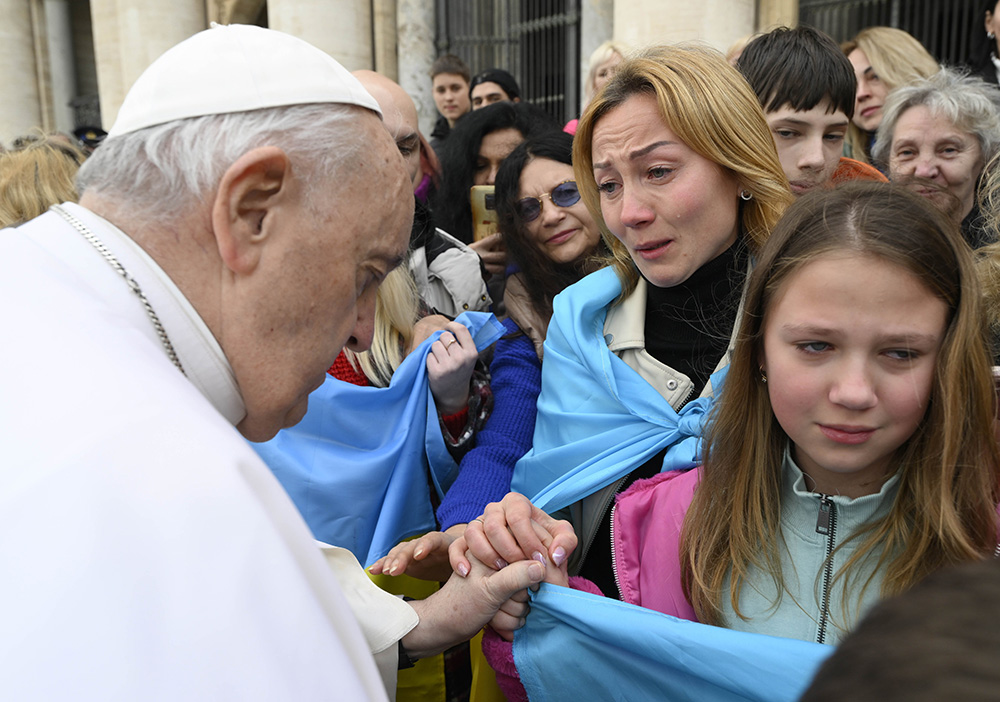
Pope Francis greets Ukrainian refugees after his weekly general audience in St. Peter's Square at the Vatican March 8, 2023. (CNS/Vatican Media)
"Where there may have been difficulties is the fact that when you've got people that are going through hell on earth, it is very difficult sometimes for them to receive some of the messaging of the pope, because the pope, as his predecessors, and there's a lot of precedents of this going back to Benedict XV in the First World War, has to talk about peace, and has to have a degree of openness to all the parties in the conflict," he said.
As the war rages on with no end in sight, Ukrainian President Volodymyr Zelensky has been actively appealing to the country's Western allies to send fighter jets to aid war efforts. While some nations have expressed an openness to the idea, most have been cautious in their response, citing fears of further escalation with Russia.
While the pope has said he believes it can be morally acceptable for countries to supply arms to Ukraine for self-defense, he also said it cannot be done with the intention of "making more war."
Gallagher offered similar caution, saying that the "committal of air fighters would be a significant escalation" and that such a move would not be seen "as a way towards peace."
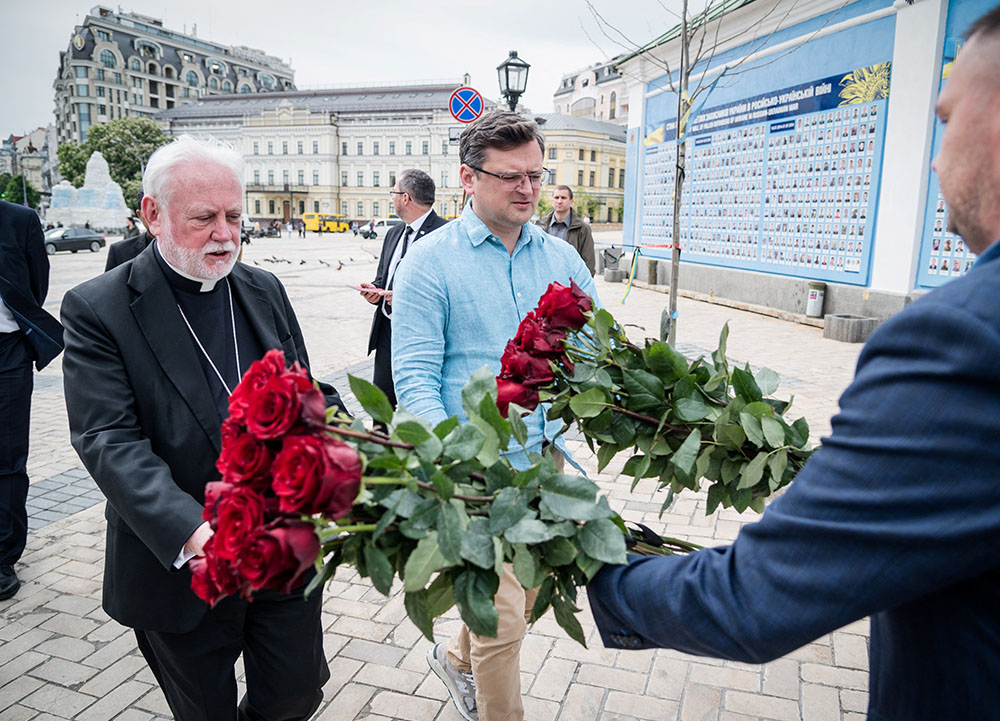
Archbishop Paul Gallagher, Vatican foreign minister, and Dmytro Kuleba, Ukraine's foreign minister, visit the Wall of Remembrance to pay tribute to killed Ukrainian soldiers, in Kyiv, Ukraine, May 20, 2022. Gallagher was meeting with church leaders, displaced people and government officials in Ukraine. (CNS/Handout via Reuters/Ukrainian Foreign Ministry Press Service)
"It's clear that leaders are not rushing to make a decision about that. And I think that probably the general position would be they don't want to," he said. "Whether they will get to a position where they feel they don't have any choice, I don't know. But I think that we should be very much invoking prudence and the long view of this sort of decision."
While Gallagher acknowledged that sometimes the Vatican's stance can be difficult for those on the outside, he said it's part of "Peter's mission" to constantly push all parties toward peace, and he believes that ultimately people understand that's a unique part of the church's role in conflicts.
"Although people can criticize, they also want the contribution of the church and of the Holy Father to be pretty unique. There are certain things that he can say nobody else can say," the archbishop said.
The China question
In 2018, the Vatican entered into a bilateral agreement with China, which, although the text remains confidential, broadly establishes procedures for selecting bishops for the country that are approved by the Holy See ahead of the ordination.
Since that time, however, experts have warned that the situation for the country's estimated 10 million-12 million Catholics has seemingly deteriorated, with church demolitions and crackdowns against Catholic priests, along with further accusations that the agreement has forced the church to remain silent on China's genocide against the Uyghur population and its repression of Tibetan Buddhists and of other Christians in China.
Despite such criticisms, Gallagher said he does not believe there is "any causal connection" between the signing of the agreement and "interventions towards religious groups in general and minorities."
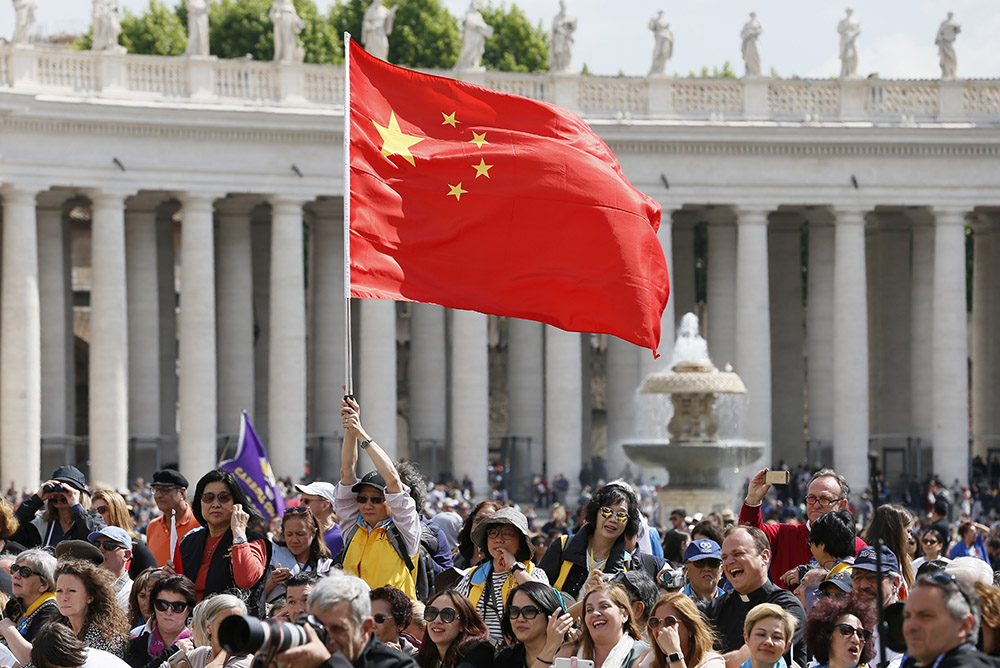
A man waves China's flag as Pope Francis leads his general audience in St. Peter's Square at the Vatican May 22, 2019. (CNS/Paul Haring)
"That the agreement is used in some provinces to put more pressure on people of the church, and in particular the clergy, I think yes, it's true," he said. "We consider this as inappropriate if a relationship of mutual trust is to be built on both sides. But we still believe in honest and positive intentions and it means we are going to persevere in our efforts to dialogue respectfully and sincerely, without failing to bring the concerns of the church to the attention of authorities."
While the archbishop said the agreement has brought some results, such as the appointment of some bishops, and the Vatican is hoping it will bring more, he said that the Vatican, along with the universal church and the church in China, is committed to "trying to carry on the work of evangelization, respecting local customs and traditions and collaborating with the authorities."
Gallagher also noted that the agreement, which requires ongoing, in-person exchanges between delegates from the Holy See and the People's Republic of China slowed down due to the COVID-19 pandemic, but said the Vatican is "confident that they will intensify in the near future."
"Here we must make one thing clear, without any illusions," he added. "The agreement is exclusively about appointing bishops, while the other open questions concerning the life and the difficulties of the church are waiting to be properly addressed and resolved."
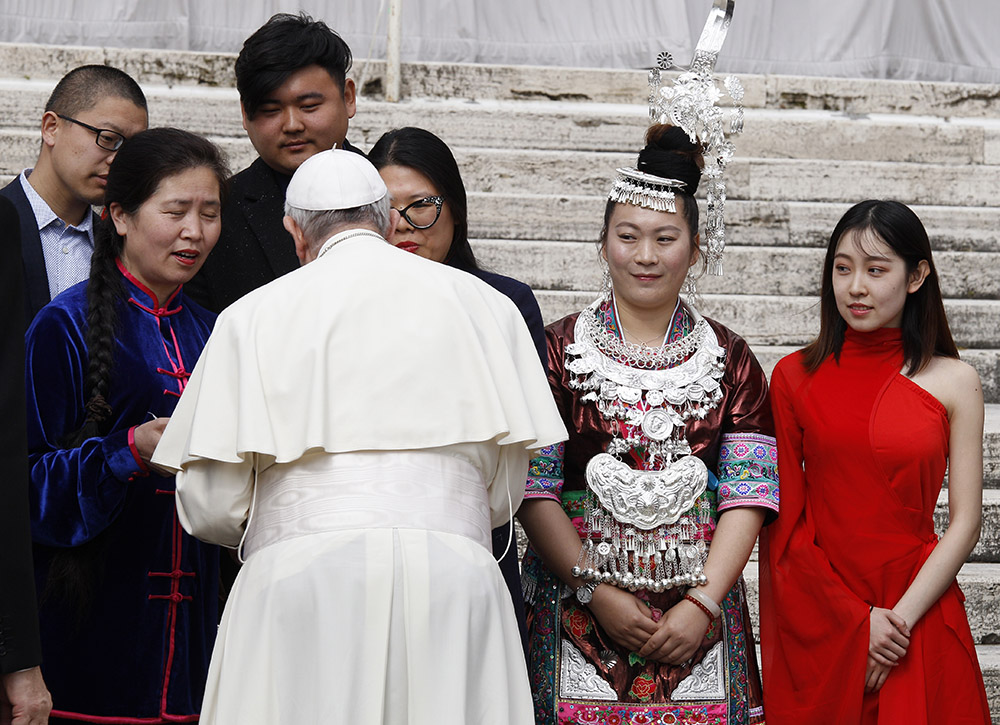
Pope Francis greets pilgrims from China during his general audience in St. Peter's Square at the Vatican March 28, 2018. (CNS/Paul Haring)
"What we are mainly concerned about is working together with the Chinese authorities in the provision of decent pastors for the church in China," he added. "We're hoping that solving the other issues will come progressively as a consequence of good episcopal appointments and the positive development of bilateral relations."
According to Francis Campbell, who served as Britain's ambassador to the Holy See from 2005 to 2011, the challenge of appointing bishops "is not a new issue," noting that a millennium ago the church wrestled with the same questions in Europe and, more recently, in Vietnam.
"The question is if the timing is right," he told NCR. "The problem is that China in this period has changed for everyone."
Ulla Gudmundson, who served as Sweden's Vatican ambassador from 2008 to 2013, echoed that concern, saying that while she supports the Holy See and China having full diplomatic relations, the timing of the current Vatican agreement is "unfortunate" given that "China is becoming more oppressive."
A pope from the Global South
When Francis appeared on the balcony of St. Peter's Basilica on the night of his election on March 13, 2013, the newly elected Argentine-born pope joked that his brother cardinals had gone "almost to the ends of the earth to get him."
But the vantage point of the world's first pontiff from the Global South has undoubtedly changed the calculus of the Holy See's diplomatic efforts over the last decade.
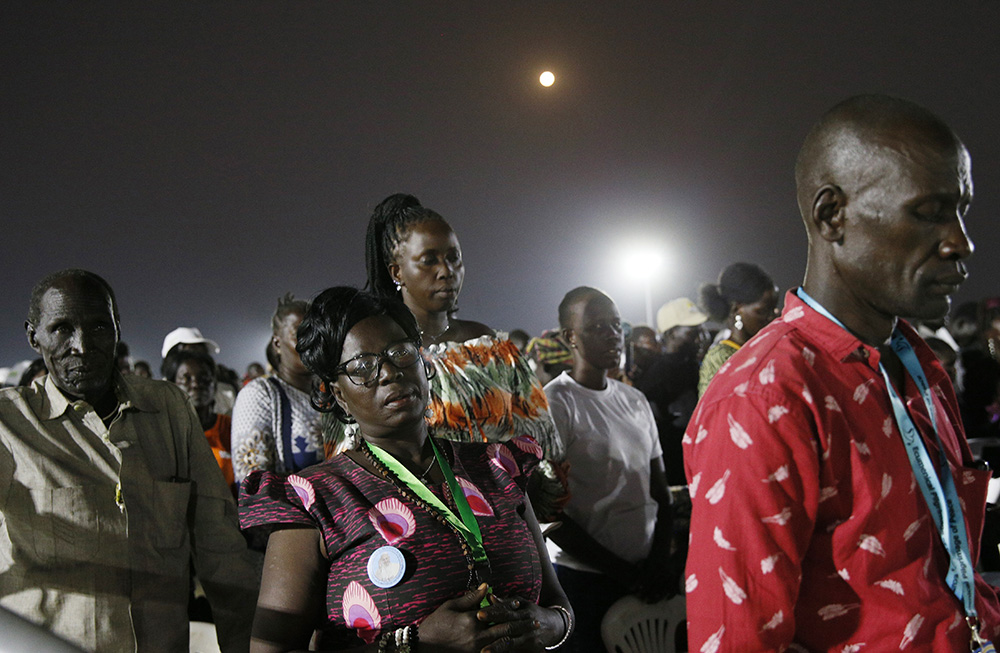
People participate in an ecumenical prayer service attended by Pope Francis at the John Garang Mausoleum in Juba, South Sudan, Feb. 4, 2023. (CNS/Paul Haring)
Campbell said that, in his view, Francis has "reoriented the voice of the papacy."
In the same way that the Polish-born Pope John Paul II brought a new perspective to Rome as the first Slavic pope and the first non-Italian to be elected since the 16th century, Campbell said that Francis, particularly through spotlighting environmental and economic concerns, has helped "remind the West of their responsibility to the Global South."
Gudmundson said that both John Paul II and Benedict XVI, as Europeans, were much more comfortable with Western alliances than Francis is. This has freed Francis up to go further than his predecessors by not just warning against the use of nuclear weapons but by condemning their very existence.
Gallagher acknowledged that with Francis "there is less identification with a world order, which is focused on Europe or North America."
"He recognizes them as part of the world order, but it is not the world order," the archbishop told NCR.
At the 10-year mark of the pontificate — where at 86, Francis refuses to allow mobility issues to slow him down from plans on the horizon to travel to Hungary, Portugal, France, Mongolia and India — Gallagher said that the Vatican's proactive diplomacy will continue to focus on "the big issues of today for humanity."
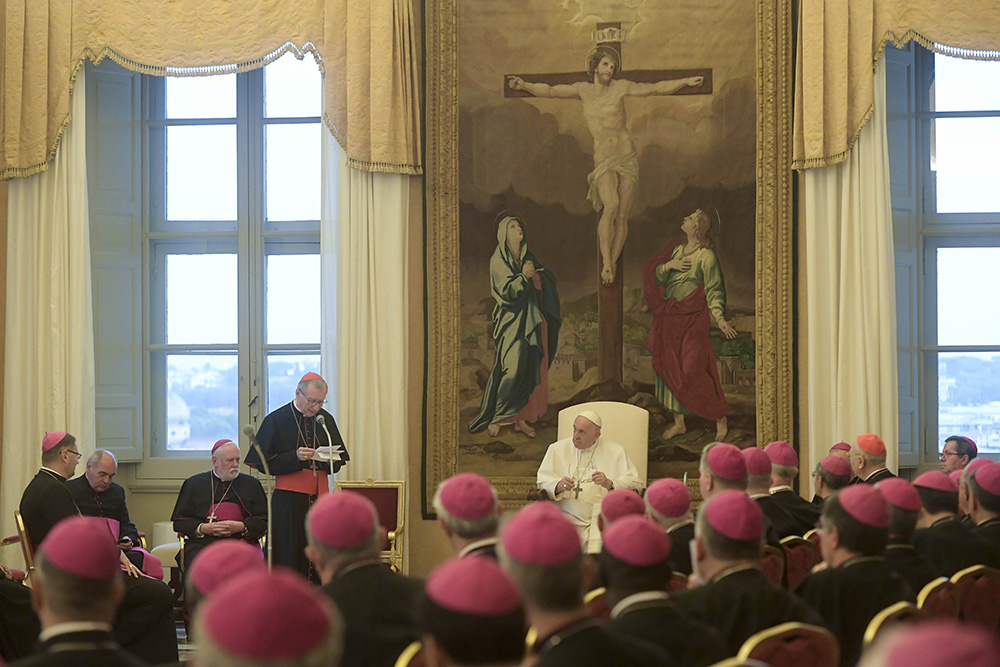
Pope Francis listens as Cardinal Pietro Parolin, Vatican secretary of state, speaks during a meeting with papal nuncios from around the world at the Vatican Sept. 8, 2022. The pope said that Europe and the entire world are being shaken by "a particularly serious war, due to the violation of international law, the risks of nuclear escalation and the drastic economic and social consequences." (CNS/Vatican Media)
At times, that challenge seems daunting, with scores of ongoing violent conflicts, environmental disasters, economic uncertainties, threats to democracy, and rising tides of nationalism and populism.
Gallagher — who said the Jan. 6, 2021, attacks on the U.S. Capitol were "deeply disturbing" and lamented the "copycat" rebellion that has been repeated elsewhere — said that the increased polarization in society today must be combated by what he termed as a return to "consensual politics" and rooting out the "great vice" of indifference by encouraging more people to participate in the political process.
And Francis, he believes, will continue to lead by example by trying to bring both the church and the world along with him by promoting a better form of politics, motivated by a spirit of fraternity and social friendship for all.
"He's really taken on the mantle of the universal pastor," said Gallagher. "And he feels that, I think, very deeply, that he has to be as much the bishop of Rome for people in the Philippines or for people in Canada, or people in parts of Africa, as he is for those of us in Italy, here in Rome, or elsewhere."





